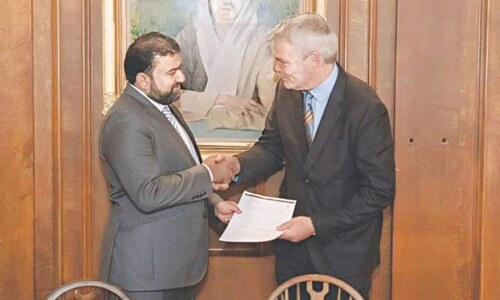CAIRO: Hosni Mubarak, the former Egyptian autocrat toppled during the 2011 Arab Spring, was freed on Friday from the military hospital where he spent much of the past six years in detention.
Mubarak, 88, had been cleared for release earlier this month after a top court finally acquitted him of involvement in protester deaths during the 2011 revolt that ousted him.
His lawyer Farid al-Deeb said the former president had gone home to a villa in Cairo’s Heliopolis district.
Mubarak had reportedly suffered health problems during his detention. He was briefly imprisoned until he slipped in a prison shower and was then transferred to the military hospital.
Mubarak was accused of inciting the deaths of protesters during the 18-day revolt, in which about 850 people were killed as police clashed with demonstrators. He was sentenced to life in jail in 2012 in the case, but an appeals court ordered a retrial which dismissed the charges two years later.
Egypt’s top appeals court on March 2 acquitted him of involvement in the killings.
Throughout his trial prosecutors had been unable to provide conclusive evidence of Mubarak’s complicity — a result, lawyers said, of having hastily put together the case against him in 2011 following demonstrations.
In January last year, the appeals court upheld a three-year prison sentence for Mubarak and his two sons on corruption charges. But the sentence took into account time served. Both of his sons, Alaa and Gamal, were freed.
On Thursday, a court ordered a renewed corruption investigation into Mubarak for allegedly receiving gifts from the state owned Al-Ahram newspaper. He is also banned from travel.
During his detention, Mubarak had remained defiant and denied wrongdoing. “When I heard the first verdict I laughed. I said: ‘Ha’,” he told a private broadcaster after his 2012 sentencing.
“I did nothing wrong at all,” he said.
Meanwhile several key activists in the 2011 uprising are now serving lengthy jail terms, and rights groups say hundreds of others have been forcibly disappeared.
The anti-Mubarak revolt ushered in instability that drove away tourists and investors, taking a heavy toll on the economy and leading to nostalgia for his rule.
His successor Mohamed Morsi ruled for only a year after his 2012 election before the military overthrew him, prompted by massive protests against his Muslim Brotherhood group.
Morsi’s overthrow ushered in a deadly police crackdown that killed hundreds of protesters demanding his reinstatement.
Published in Dawn, March 25th, 2017












































Dear visitor, the comments section is undergoing an overhaul and will return soon.